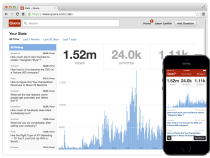
30% to 40% of Quora's traffic comes from people searching for specific things, so it tells me that search ads that leverage intent make perfect sense for how it eventually monetizes its Q&A service. The news comes alongside the launch of Quora Stats, a new analytics tool that shows authors exactly how much traffic their Quora questions, answers, and blog posts are getting.
Quora has raised approximately $70 million since being founded in 2009, but has refused to share specific traffic stats or make any concrete moves towards earning money. Instead it's been focused on growing to a wider audience of contributors and readers without diluting the quality of its content. Quora said in May that all its metrics were up 3x from a year before.
Traffic measurement services Quantcast and Compete both show Quora up over the last few months to 600,000 monthly uniques and 1 million monthly uniques respectively in September, but Compete still shows the service slightly down from a high a year ago. This may not take into account Quora's growth on mobile, though. To get bigger, Quora needs to retain its top contributors. Hence, Quora Stats.
The new analytics tool is designed to show Quora authors that they have serious reach. The whole Q&A site, and especially the blogging platform, were built on the premise that anyone sharing great content can have a big audience on Quora. Because Quora's home page feed highlights content from across the service rather than just people you follow like Facebook or Twitter, you don't have to be a celebrity or have built up a personal following to make a splash.
Quora Stats aims to prove that. It replaces the very basic Quora Views tool that simply noted your total views of all your content for each month. Quora Stats, rolling out over the next few weeks, will show you breakdowns of the views for each of your questions, answers, and blog posts. As you can see above, you also get aggregate stats and a chart over time for your views, upvotes, and shares. You can slice these metrics by the last 7, 30, or 90 days or all-time.
But more interesting than the new tool may be what Quora's Marc Bodnick told me yesterday about the site's plan for monetization. “Advertising at a baseline is a very appealing business model. There are other potential strategies for making money, but interestingly, when you look down and see what people are doing in this database, ‘look up' is a big part of it. So I think at a minimum, this is a pretty interesting framework for what a business model could be built around.”
Essentially, people come to Quora looking for knowledge about specific topics. What's the best DSLR camera? Is the new Thor movie good? What's the best SUV under $30,000? If these remind you of what people search on Google, you can probably see how Quora could monetize in a similar way. If it showed standard display ads for cameras, movies, or cars for people searching for related topics, that could work. It could also let brands pay to promote the rankings of certain answers that favored their products, though that might pervert Quora's quest to become a neutral source of knowledge.
When pressed over email, Bodnick wrote “We have said that advertising is a very plausible direction for the company to go when we do look to ultimately monetize. This is reinforced by the high percentage of direct intent traffic on Quora, which we estimate to be at 30-40%. That said – the company has no near term plans to monetize. The best insight is probably that directly from Adam.
Bodnick concluded “ We've looked at the commercial internet and as portion of the traffic, it's pretty exciting what percentage it accounts for.” When I asked “So are you hinting that search ads based on intent will be how Quora eventually monetizes?” Bodnick said with a laugh, “I'm not just hinting” implying that is in fact part of the long term strategy.
ConversionConversion EmoticonEmoticon